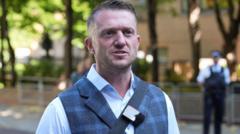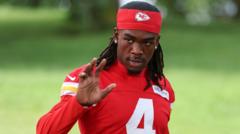Will Tommy Robinson Face Charges for the St Pancras Incident?

Published: 2025-08-27 17:49:09 | Category: technology
Far-right activist Tommy Robinson, whose real name is Stephen Yaxley-Lennon, will not face further legal action following his arrest linked to an alleged assault at St Pancras railway station in London on 28 July. The British Transport Police (BTP) reported that the Crown Prosecution Service (CPS) determined there was insufficient evidence to pursue charges, largely due to the victim’s unwillingness to cooperate.
Last updated: 14 October 2023 (BST)
Incident Overview
The incident at St Pancras railway station involved a man who was found with serious but non-life-threatening injuries. He was subsequently discharged from the hospital. Footage shared on social media showed Robinson near the victim, who was lying motionless on the ground while a commuter attempted to intervene and call for help.
Key Takeaways
- Tommy Robinson will not face charges after his arrest related to an assault.
- The alleged victim declined to provide a statement to police.
- The Crown Prosecution Service cited insufficient evidence for prosecution.
- Robinson claimed he was acting in self-defence during the incident.
- The BTP conducted a thorough investigation, including reviewing CCTV footage.
What Happened at St Pancras Station?
On 28 July 2023, a serious incident occurred at St Pancras station that led to a man being found injured. The details surrounding the incident suggest a confrontation that escalated, resulting in injuries to the unidentified victim. The BTP's rapid response included gathering evidence and making an arrest shortly after the incident.
Robinson's Arrest and Reaction
The arrest of Tommy Robinson occurred on 4 August at Luton Airport, where he was taken into custody under suspicion of grievous bodily harm (GBH). Following his arrest, Robinson expressed confusion regarding the charges and insisted that he had been defending himself. His claims raise questions about the circumstances leading to the incident and the nature of self-defence in such situations.
Investigation Findings
The BTP conducted a comprehensive investigation, which included the collection of CCTV footage and witness statements. Despite their efforts, the investigation faced a significant hurdle: the victim's refusal to cooperate. This lack of cooperation ultimately influenced the CPS's decision not to pursue charges against Robinson.
Crown Prosecution Service's Conclusion
After reviewing the evidence presented by the BTP, the CPS concluded that there was "not a realistic prospect of conviction," leading to the decision not to bring any charges. This resolution highlights the complexities often involved in legal cases, particularly when victim testimony is absent or unwilling.
Implications of the Case
The decision not to charge Robinson may have broader implications, particularly regarding public perceptions of justice and accountability in cases involving public figures or activists. The incident raises critical questions about the role of law enforcement and the legal system in handling allegations of violence, especially when self-defence is claimed.
Public Reaction and Commentary
The public reaction to this case has been mixed, with some supporting Robinson and others condemning his actions. The polarising nature of Robinson’s activism and his past controversies add layers of complexity to public opinion. Observers note that incidents involving figures like Robinson often provoke larger discussions about extremism, civil rights, and the responsibilities of individuals in public spaces.
What Happens Next?
While Robinson is currently free from legal repercussions concerning this incident, the potential for future legal challenges remains. The BTP's thorough investigation may continue to influence public discussions about safety and conduct in public places. Furthermore, the case may impact Robinson's public image and his activism moving forward.
Legal Context of Self-Defence
Self-defence is a complex legal concept that varies significantly by jurisdiction. In the UK, individuals are permitted to use reasonable force to protect themselves or others from harm. However, the definition of "reasonable" can often be subjective, making legal outcomes unpredictable. This case serves as a reminder of the nuances involved in self-defence claims, especially in public settings.
Conclusion
In summary, the decision by the CPS not to pursue charges against Tommy Robinson underscores the challenges faced in legal proceedings involving alleged assaults, particularly when victim cooperation is lacking. The implications of this case extend beyond Robinson himself, prompting discussions about self-defence, public safety, and the efficacy of the legal system in handling such matters. As public interest in this case continues, it remains to be seen what impact it will have on Robinson's activism and public perception.
As the legal landscape evolves, how should society balance the rights of individuals, the need for public safety, and the responsibilities of activists? #TommyRobinson #SelfDefence #PublicSafety
FAQs
What led to Tommy Robinson's arrest at St Pancras station?
Tommy Robinson was arrested following an incident on 28 July 2023, where a man was found with serious injuries. Robinson was suspected of grievous bodily harm.
Why were no charges brought against Robinson?
The Crown Prosecution Service concluded there was insufficient evidence to charge Robinson, primarily due to the victim's refusal to provide a statement.
What is the legal definition of self-defence in the UK?
In the UK, self-defence allows individuals to use reasonable force to protect themselves or others from harm. The definition of "reasonable" varies by case.
How does the lack of victim cooperation affect legal cases?
Lack of victim cooperation can significantly hinder legal proceedings, making it challenging for law enforcement and prosecutors to build a solid case.
What are the implications of this case for public activism?
This case raises important questions about the accountability of public figures and the legal protections afforded to activists, potentially influencing public opinion and future activism.



